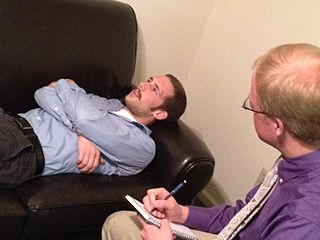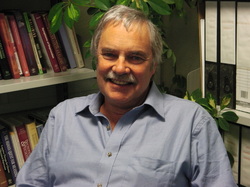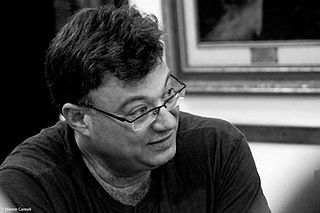
Cognitive behavioral therapy (CBT) is a form of psychotherapy that aims to reduce symptoms of various mental health conditions, primarily depression, PTSD and anxiety disorders. Cognitive behavioral therapy focuses on challenging and changing cognitive distortions and their associated behaviors to improve emotional regulation and develop personal coping strategies that target solving current problems. Though it was originally designed to treat depression, its uses have been expanded to include many issues and the treatment of many mental health and other conditions, including anxiety, substance use disorders, marital problems, ADHD, and eating disorders. CBT includes a number of cognitive or behavioral psychotherapies that treat defined psychopathologies using evidence-based techniques and strategies.
Psychotherapy is the use of psychological methods, particularly when based on regular personal interaction, to help a person change behavior, increase happiness, and overcome problems. Psychotherapy aims to improve an individual's well-being and mental health, to resolve or mitigate troublesome behaviors, beliefs, compulsions, thoughts, or emotions, and to improve relationships and social skills. Numerous types of psychotherapy have been designed either for individual adults, families, or children and adolescents. Certain types of psychotherapy are considered evidence-based for treating some diagnosed mental disorders; other types have been criticized as pseudoscience.
Psychology is an academic and applied discipline involving the scientific study of human mental functions and behavior. Occasionally, in addition or opposition to employing the scientific method, it also relies on symbolic interpretation and critical analysis, although these traditions have tended to be less pronounced than in other social sciences, such as sociology. Psychologists study phenomena such as perception, cognition, emotion, personality, behavior, and interpersonal relationships. Some, especially depth psychologists, also study the unconscious mind.
Clinical psychology is an integration of human science, behavioral science, theory, and clinical knowledge for the purpose of understanding, preventing, and relieving psychologically-based distress or dysfunction and to promote subjective well-being and personal development. Central to its practice are psychological assessment, clinical formulation, and psychotherapy, although clinical psychologists also engage in research, teaching, consultation, forensic testimony, and program development and administration. In many countries, clinical psychology is a regulated mental health profession.

Aaron Temkin Beck was an American psychiatrist who was a professor in the department of psychiatry at the University of Pennsylvania. He is regarded as the father of cognitive therapy and cognitive behavioral therapy (CBT). His pioneering methods are widely used in the treatment of clinical depression and various anxiety disorders. Beck also developed self-report measures for depression and anxiety, notably the Beck Depression Inventory (BDI), which became one of the most widely used instruments for measuring the severity of depression. In 1994 he and his daughter, psychologist Judith S. Beck, founded the nonprofit Beck Institute for Cognitive Behavior Therapy, which provides CBT treatment and training, as well as research. Beck served as President Emeritus of the organization up until his death.
Biological psychiatry or biopsychiatry is an approach to psychiatry that aims to understand mental disorder in terms of the biological function of the nervous system. It is interdisciplinary in its approach and draws on sciences such as neuroscience, psychopharmacology, biochemistry, genetics, epigenetics and physiology to investigate the biological bases of behavior and psychopathology. Biopsychiatry is the branch of medicine which deals with the study of the biological function of the nervous system in mental disorders.
Child psychopathology refers to the scientific study of mental disorders in children and adolescents. Oppositional defiant disorder, attention-deficit hyperactivity disorder, and autism spectrum disorder are examples of psychopathology that are typically first diagnosed during childhood. Mental health providers who work with children and adolescents are informed by research in developmental psychology, clinical child psychology, and family systems. Lists of child and adult mental disorders can be found in the International Statistical Classification of Diseases and Related Health Problems, 10th Edition (ICD-10), published by the World Health Organization (WHO) and in the Diagnostic and Statistical Manual of Mental Disorders, Fifth Edition (DSM-5), published by the American Psychiatric Association (APA). In addition, the Diagnostic Classification of Mental Health and Developmental Disorders of Infancy and Early Childhood is used in assessing mental health and developmental disorders in children up to age five.
The Dodo bird verdict is a controversial topic in psychotherapy, referring to the claim that all empirically validated psychotherapies, regardless of their specific components, produce equivalent outcomes. It is named after the Dodo character in Alice in Wonderland. The conjecture was introduced by Saul Rosenzweig in 1936, drawing on imagery from Lewis Carroll's novel Alice's Adventures in Wonderland, but only came into prominence with the emergence of new research evidence in the 1970s.
The following outline is provided as an overview of and topical guide to psychology:
Mental disorders are classified as a psychological condition marked primarily by sufficient disorganization of personality, mind, and emotions to seriously impair the normal psychological and often social functioning of the individual. Individuals diagnosed with certain mental disorders can be unable to function normally in society. Mental disorders may consist of several affective, behavioral, cognitive and perceptual components. The acknowledgement and understanding of mental health conditions has changed over time and across cultures. There are still variations in the definition, classification, and treatment of mental disorders.

In applied psychology, interventions are actions performed to bring about change in people. A wide range of intervention strategies exist and they are directed towards various types of issues. Most generally, it means any activities used to modify behavior, emotional state, or feelings. Psychological interventions have many different applications and the most common use is for the treatment of mental disorders, most commonly using psychotherapy. The ultimate goal behind these interventions is not only to alleviate symptoms but also to target the root cause of mental disorders.
Gay affirmative psychotherapy is a form of psychotherapy for non-heterosexual people, specifically gay and lesbian clients, which focuses on client comfort in working towards authenticity and self-acceptance regarding sexual orientation, and does not attempt to "change" them to heterosexual, or to "eliminate or diminish" same-sex "desires and behaviors". The American Psychological Association (APA) offers guidelines and materials for gay affirmative psychotherapy. Affirmative psychotherapy affirms that homosexuality or bisexuality is not a mental disorder, in accordance with global scientific consensus. In fact, embracing and affirming gay identity can be a key component to recovery from other mental illnesses or substance abuse. Clients whose religious beliefs are interpreted as teaching against homosexual behavior may require some other method of integration of their possibly conflicting religious and sexual selves.
Guided imagery is a mind-body intervention by which a trained practitioner or teacher helps a participant or patient to evoke and generate mental images that simulate or recreate the sensory perception of sights, sounds, tastes, smells, movements, and images associated with touch, such as texture, temperature, and pressure, as well as imaginative or mental content that the participant or patient experiences as defying conventional sensory categories, and that may precipitate strong emotions or feelings in the absence of the stimuli to which correlating sensory receptors are receptive.
The mainstay of management of borderline personality disorder is various forms of psychotherapy with medications being found to be of little use.
Psychology encompasses a vast domain, and includes many different approaches to the study of mental processes and behavior. Below are the major areas of inquiry that taken together constitute psychology. A comprehensive list of the sub-fields and areas within psychology can be found at the list of psychology topics and list of psychology disciplines.

Paul Raymond Gilbert is a British clinical psychologist. Gilbert is the founder of compassion focused therapy (CFT), compassionate mind training (CMT) and the author of books such as The Compassionate Mind: A New Approach to Life's Challenges and Overcoming Depression.
Sidney J. Blatt was a professor emeritus of psychiatry and psychology at Yale University's Department of psychiatry. Blatt was a psychoanalyst and clinical psychologist, empirical researcher and personality theoretician, who made enormous contributions to the understanding of personality development and psychopathology. His wide-ranging areas of scholarship and expertise included clinical assessment, psychoanalysis, cognitive schemas, mental representation, psychopathology, depression, schizophrenia, and the therapeutic process, as well as the history of art. During a long and productive academic career, Blatt published 16 books and nearly 250 articles and developed several extensively used assessment procedures. Blatt died on May 11, 2014, in Hamden, Conn. He was 85.

Golan Shahar is an Israeli clinical health psychologist and an interdisciplinary stress/psychopathology researcher.
Pain psychology is the study of psychological and behavioral processes in chronic pain. Pain psychology involves the implementation of treatments for chronic pain. Pain psychology can also be regarded as a branch of medical psychology, as many conditions associated with chronic pain have significant medical outcomes. Untreated pain or ineffective treatment of pain can result in symptoms of anxiety, depression, and suicidal thoughts, thus it is vital that appropriate pain management occur in a timely fashion following symptom onset.

Keith Stephen Dobson is a Canadian psychologist, academic, and researcher. With a long career at the University of Calgary in Canada, he now holds the title of Professor Emeritus, having served as a tenured Professor, Head of the Psychology Department, and Director of the Clinical Psychology program at the university.





